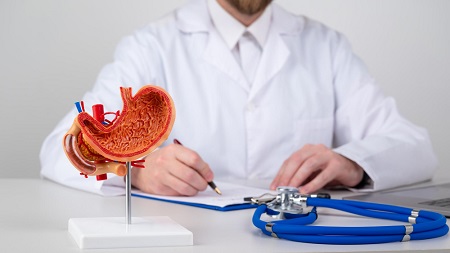Gastrointestinal (GI) problems can make life miserable. Issues with your digestion and bowel movements are fairly commonplace but while some minor ailments heal on their own or are cured by home remedies or over-the-counter medications, others could, if not diagnosed and treated in time, lead to medical problems that can severely impact quality of life. So, what are the common signs that your GI problems should be examined, diagnosed and treated by a specialist in GI issues?
Common Symptoms of GI Ailments
Here are some of the symptoms that often need specialized investigation by a gastroenterologist.
- check box
- Severe and Ongoing Diarrhea: Food-related infection, taking certain medications, and other health issues can cause or contribute to the onset of diarrhea. If the cause of the problem is unknown, if over-the-counter medications do not relieve the problem, or if it continues to worsen, the cause should be ascertained by a GI specialist. Chronic diarrhea can be an indication of various GI issues, including irritable bowel syndrome, inflammatory bowel disease, bacterial infections and others. All these conditions can be treated once the cause is diagnosed.
- Constipation: The frequency of bowel movements varies from person to person. Some with a healthy digestive system may pass stools one or more times a day while others may not have a bowel movement for 2 days. That said, it is generally accepted that less than 3 bowel movements a week over a long period of time, can be considered as constipation. Incomplete emptying of the bowels and/or hard stools could also be signs of constipation. The use of laxatives for an extended period to relieve the constipated condition can lead to various GI issues. Any case of constipation that lasts for a week or more should be checked by a gastroenterologist. If the cause is serious, the earlier it is diagnosed and treatment started, the better. In other cases, lifestyle and dietary changes and medication can help relieve or control the problem.
- Sudden Abdominal Pain: Everyone has suffered the occasional stomachache. But if the pain occurs frequently or is continuous, or if the pain is debilitating, the problem may be a serious one. Among the many causes of severe abdominal pain are stomach ulcers, gallstones, liver disease or pancreatitis. Only expert examination and diagnosis can reveal the cause of the problem which will allow for treatment to begin to alleviate the pain and prevent the condition from worsening.
- Bloody Stools: Blood in the stool or in the toilet after a bowel movement could be just a common case of hemorrhoids (or piles) which can often be managed with home remedies or over-the-counter products. However, the presence of blood could also be the sign of a more serious GI condition that requires specialized treatment to prevent it from becoming a life-threatening condition. Whatever the possible cause, having the condition diagnosed by a gastroenterologist is important.
- Heartburn: An occasional case of heartburn is not uncommon. It is generally brought about by eating an excess of fried, spicy or heavy food and it is a sign that the digestive system is stressed by the food that has been consumed. Taking antacids and making changes in the diet can usually resolve the problem. However, if the heartburn occurs regularly or several times a week (with a gap between occurrences), it is often a sign of gastroesophageal reflux disease (GERD), a condition that can lead to damage and scarring of the lining of the esophagus. If GERD is not treated in time, it can cause serious and permanent damage to the esophagus, which in turn can lead to problems in swallowing, the development of painful ulcers and even the risk of developing esophageal cancer.
Also Read: Acid Reflux Should Not Be Ignored
- Feeling Bloated: Feeling bloated because of overeating is a condition which most people experience once in a while. However, if the condition is chronic or occurs regularly, then it could be that your bowels are obstructed thus allowing waste to remain in the system. This un-expelled waste is bad enough but it can also lead to bacteria-related fermentation which results in the production of gas which increases the severity of the problem. The discomfort of the bloating and the embarrassment of flatulence require specialized treatment. In the worst case, the bloating could be the result of irritable bowel syndrome, lactose intolerance and other food sensitivities, excessive bacterial growth in the intestines, or a case of partial paralysis of the stomach.
- Unintended Weight Loss: If you are losing weight without trying to do so, it is often a sign of a GI problem such as a peptic ulcer or inflammatory bowel disease.
- Weakness or Anemia: Symptoms of fatigue, dizziness, shortness of breath or shivering could have many causes. Or they could be the result of digestive problems that restrict the absorption of vital nutrients and elements that are required for strength and good health.
These are just a few of the common signs of GI problems that require specialized medical attention. A gastroenterologist will be able to diagnose and treat the ailment and if there are other medical issues involved, refer you to the relevant specialist for additional essential treatment.
GI problems are among the most common, and modern lifestyles are contributing to the spread of the problem. Because gastrointestinal problems could have many causes, it is best to get examined and treated at a multispecialty hospital where there are not only the best gastroenterologists but also leading specialists in other medical fields who can, if required, contribute to the treatment to provide the patient with the best and most effective cure and management plans. A leading multispecialty hospital is also the place where the most advanced diagnostic and treatment protocols and procedures will be available. GI issues can severely impact life in a multitude of ways and the earlier these are diagnosed and treated, the better and faster the recovery.
Frequently Asked Questions
When should I see a gastroenterologist?
If you experience persistent symptoms like abdominal pain, diarrhea, constipation, or blood in your stool, it’s time to consult a GI specialist.
Is constant bloating a sign of a serious digestive issue?
Yes. Chronic bloating could be linked to food intolerances, bowel obstruction, or IBS. A gastroenterologist can diagnose and treat the cause.
Can heartburn lead to serious health problems?
Frequent heartburn may indicate GERD, which can damage the esophagus over time and increase the risk of ulcers or esophageal cancer.
Why is blood in the stool concerning?
While it could be due to hemorrhoids, it might also signal a more serious condition like ulcers, IBD, or colorectal cancer. Always get it checked.
Does unintended weight loss relate to digestive issues?
Yes. Sudden weight loss without dieting may indicate conditions like peptic ulcers or inflammatory bowel disease.
What are signs of poor nutrient absorption?
Fatigue, weakness, dizziness, and anemia could result from poor nutrient absorption due to digestive disorders like celiac disease or Crohn’s disease.


